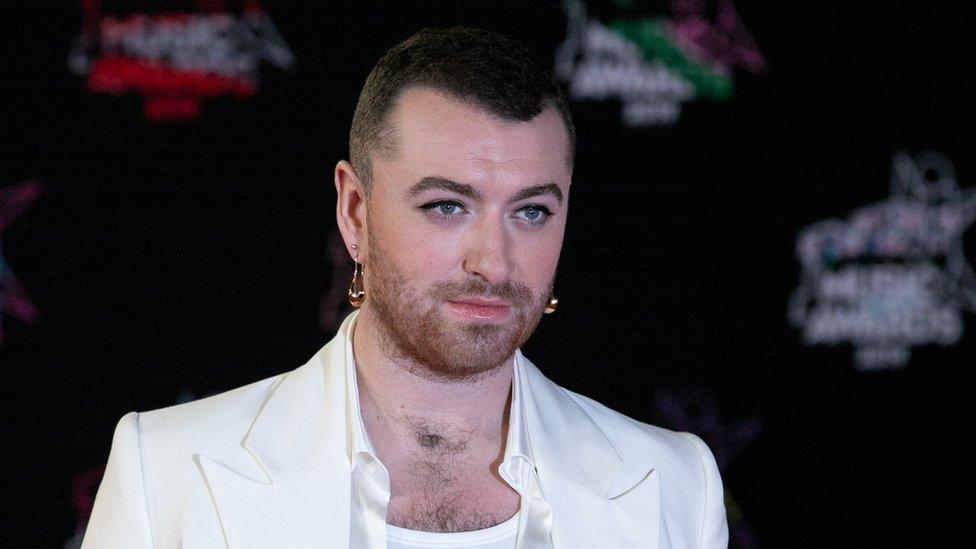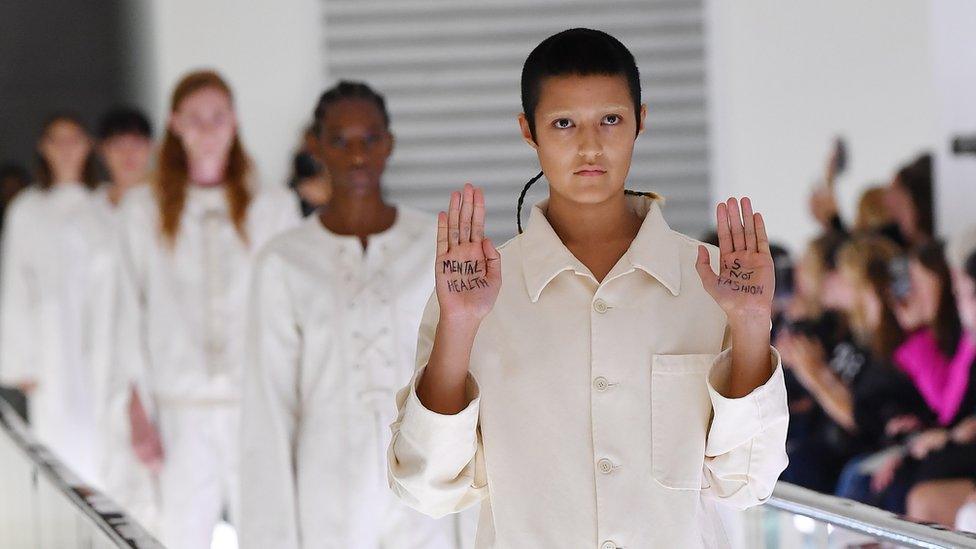Merriam-Webster: Non-binary pronoun 'they' is word of year
- Published

Singer Sam Smith came out as non-binary this year, and confirmed that their pronouns are they/them
Merriam-Webster has named "they" its word of the year.
The US dictionary also recently added a new definition of "they", reflecting its use as a singular personal pronoun for non-binary people.
Searches for "they" on Merriam-Webster's website were 313% higher this year than they were in 2018.
British pop star Sam Smith came out as non-binary in March, and in September confirmed on Instagram that their pronouns were "they/them".
Announcing their pronouns, Smith wrote: "I understand there will be many mistakes and misgendering, but all I ask is you please please try. I hope you can see me like I see myself now."
A number of other high-profile non-binary figures were also in the news this year.

Non-binary model Oslo Grace shot to prominence this year
Catwalk model Oslo Grace rose to prominence in January, and spoke to fashion magazines Vogue and Dazed and Confused about their gender identity and the fashion world.
Another non-binary model, Ayesha Tan Jones, was also in the news in September - for staging a silent protest while walking a Gucci show in September.
Non-binary artists have gained prominence in the UK too.
Travis Alabanza's play Burgerz is based on a transphobic attack in which someone threw a burger at them, while Amrou al-Kadhi - aka Glamrou - released their memoir Unicorn, on life as a Muslim drag queen.
Drag queen Glamrou on the politics of gender and identity
Peter Sokolowski, Merriam-Webster's editor-at-large, told the Associated Press news agency that searches shot up when Oslo Grace was rising to prominence, when Sam Smith came out, and when US congresswoman Pramila Jayapal spoke about her gender-nonconforming child while arguing for LGBTQ rights legislation in April.
"It reflects a surprising fact: even a basic term - a personal pronoun - can rise to the top of our data," the dictionary said in a statement.
"Although our look-ups are often driven by events in the news, the dictionary is also a primary resource for information about language itself, and the shifting use of 'they' has been the subject of increasing study and commentary in recent years.
"English famously lacks a gender-neutral singular pronoun to correspond neatly with singular pronouns like 'everyone' or 'someone', and as a consequence 'they' has been used for this purpose for over 600 years."

Previous Merriam-Webster words of the year
2018: justice
2017: feminism
2016: surreal
2015: -ism
2014: culture

Merriam-Webster's runners-up were also influenced by the news - "impeach" and "quid pro quo", based on the ongoing impeachment hearings into US President Donald Trump, and "camp", which was the theme of this year's Met Gala.
Last month, Collins dictionary also recognised the term "non-binary" as a description of people who do not identify as male or female.
However its word of the year (actually, words of the year) was "climate strike", after an international protest movement calling for action to combat the climate crisis.
- Published7 November 2019

- Published23 September 2019

- Published14 September 2019

- Published21 September 2019
